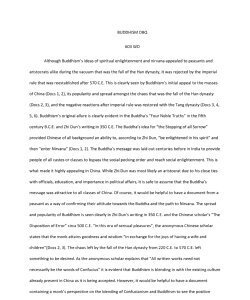BUDDHISM DBQ Although Buddhism’s ideas of spiritual enlightenment and nirvana appealed to peasants and aristocrats alike during the vacuum that was the fall of the Han dynasty, it was rejected by the
BUDDHISM DBQ Although Buddhism’s ideas of spiritual enlightenment and nirvana appealed to peasants and aristocrats alike during the vacuum that was the fall of the Han dynasty, it was rejected by the
BUDDHISM DBQ
603 WD
Although Buddhism’s ideas of spiritual enlightenment and nirvana appealed to peasants and aristocrats alike during the vacuum that was the fall of the Han dynasty, it was rejected by the imperial rule that was reestablished after 570 C.E. This is clearly seen by Buddhism’s initial appeal to the masses of China (Docs 1, 2), its popularity and spread amongst the chaos that was the fall of the Han dynasty (Docs 2, 3), and the negative reactions after imperial rule was restored with the Tang dynasty (Docs 3, 4, 5, 6). Buddhism’s original allure is clearly evident in the Buddha’s “Four Noble Truths” in the fifth century B.C.E. and Zhi Dun’s writing in 350 C.E. The Buddha’s idea for “the Stopping of all Sorrow” provided Chinese of all background an ability to, according to Zhi Dun, “be enlightened in his spirit” and
